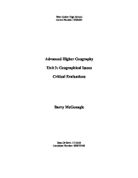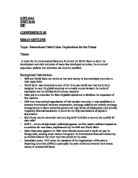The problem however, has not gone unnoticed and various organisations within the developed world have differing views on how it should be dealt with.
Despite it’s roll as a business, the World Bank appreciates that Ghana’s debt is an issue which must be addressed. In an attempt to support Ghana and various other indebted countries, the bank worked in conjunction with the International Monetary Fund (IMF) to produce the Heavily Indebted Poor Countries (HIPC) initiative. The initiative is a unique approach to tackling international debt, targeting Third World countries with the lowest debt sustainability (repayment capabilities). The aim is to ensure that Third World nations are not faced with debt which they can’t afford to pay and that the funds released through the initiative are channelled into vital sectors such as education and health care. Bilateral creditors and multilateral lenders cover the expense incurred from the scheme.
However, such an attempt at debt relief has been scrutinised by various charity organisations such as Christian Aid. They believe that although the HIPC initiative is good in principle, the World Bank could be doing more in the way of international debt relief. Another criticism Christian Aid has of the HIPC is that only countries affected severely by debt qualify for the scheme, this is a mere 26 countries. Ideally the boundaries should be expanded further to help larger numbers of the world poorest nations.
Through the HIPC initiative, in February of 2002, Ghana signed a debt cancellation deal with IMF and The World Bank worth $3.7 billion. Despite this, many people living in Ghana are a little sceptical of the scheme:
“People are sceptical about the debt relief process because the poverty reduction strategies that we have had in the past were a total disaster” Samuel Zann, Ghanaian citizen and director of SEND foundation in Tamale (see figure 1)
Nine out of ten people in Tamale live below the poverty line and regardless of past debt relief schemes which have promised improvements in the peoples' standard of living, the locals are yet to experience any benefits. The majority of Ghanaian people believe that money they have received in the past has been invested in areas which stimulate little social benefit. Although the HIPC scheme requires governments to utilise the monetary benefits in abolishing poverty within the country, the fact that there is no social input to how the money should be used worries much of Ghana’s poor inhabitants. The decisions on how to tackle the countries poverty are made by the government upon consultation with IMF and The World Bank; this makes a social analysis seem irrelevant.
Even though the HIPC initiative has been subject to much criticism the World Bank maintains that it is doing its utmost to help Ghana out of its current debt predicament. Despite demands from Christian Aid to simply cancel larger amounts of the debt, the bank argues it has done as much as it possibly can. Operating as a business means the bank must adopt the most basic of business principles. This includes protecting the shareholders interests and ensuring they receive an adequate annual dividend. If the bank were to eradicate larger amounts of Ghana’s debt and the then eventually the business would be forced into liquidity. The bank’s liquidity would have huge implications on the global market and Third World countries would have to look elsewhere to find financial aid. The World Bank also argues that although it does have some Third World debtors, other multilateral development banks account for larger percentages of Third World debt, although Figure 2 shows that the bank is responsible for a huge proportion of it.
Figure 2: Stock Of Ghana’s External Debt 2001
(adapted from world bank's website section on the HIPC initiative)
Jubilee Research is an organisation which was co- founded originally as Jubilee 2000 in the year 2000 by Christian Aid. The movement’s aim is to focus specifically on the issue of Third World debt and it’s views conflict directly with those of The World Bank.
Jubilee Research believes that today’s international market is a place of corruption and moral injustice. The movement’s members criticise The World Bank’s business policy, questioning how a few rich investors can take precedence over millions of poor starving human beings. Jubilee Research also believes that Ghana and various other Third World nations were deceived by institutions such as the World Bank when entering into the initial loan agreements.
The Research movement perpetually appeals for political recognition and contribution towards the Third World debt crisis.
The UK government has answered Jubilee Research’s cries for help in September of 2002, pledging $155 million towards the global debt relief fund. This contribution will be issued along with pledges from another six of the world greatest economies, the promised total being $1 billion. The money generated through the scheme will go a long way to relieving debt tension in various Third World countries, including Ghana. Despite this the World Bank are unimpressed by this politically driven financial aid scheme:
“The debt relief will provide Third World countries with a sound financial base, however it will not be maintained without improved policies in rich and in poor nations” (James Wolfensohn, president of the World Bank, worldbank.org)
Mr Wolfensohn believes that simply granting money to debt relief funds is not enough and that the world’s economically sound nations have to ensure that the funds released through this scheme are utilised effectively in the countries involved. The World Bank’s president also believes that debt relief in this form has to be complimented with an improvement in global markets and international financial policies.
From a personal point of view, I understand fully the World Bank’s angle and I appreciate that in order to continue functioning the bank must work towards making profits. However, the fact that the bank seems to believe money is of more value than human life is morally wrong. Its not a question of making profits for the shareholders, it is a question of where these peoples’ values lie. To give money precedence over life is moral bankruptcy.
I feel Christian Aid and Jubilee Research were right to criticise the World Bank’s methods. In my opinion organisations such as the World Bank initially exploited the poorer nations financial fragility for their own benefit by offering loans disguised with low interest rates which were to rapidly increase once the amount had been agreed. I feel there must have been some degree of deception involved in the initial lending process, as I don’t believe so many astute Third World governments would enter into agreements which they knew they could not fulfil. Much of the information I found on the World Bank contained an element of bias. The articles from which I extracted much of my information were written by directors and senior members of the bank, who will almost indefinitely be shareholders. The fact that less debt relief would mean higher profits and therefore higher dividends I feel would influence their perspectives when writing articles regarding the Third World debt crisis. In order to balance my essay I made use of the Guardian newspapers articles concerning debt in Ghana, as I felt they were written in such a way that all points were portrayed clearly and accurately without bias.
Sources
Bradley. E & Cunningham. R Core Themes In Geography: Human Oliver & Boyd
Various Authors The African Debt Report Jubilee 2000 Coalition Page 21
Word Count: 1, 459







